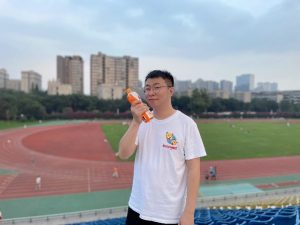Jiawei Xiong: The Plant Cell First Author

 Jiawei Xiong, first author of “The deubiquitinating enzymes UBP12 and UBP13 positively regulate recovery after carbon starvation by modulating BES1 stability in Arabidopsis thaliana”
Jiawei Xiong, first author of “The deubiquitinating enzymes UBP12 and UBP13 positively regulate recovery after carbon starvation by modulating BES1 stability in Arabidopsis thaliana”
Current Position: Ph.D. candidate, Sichuan University
Education: Bachelor’s degree, Sichuan Agricultural University
Non-scientific Interests: Reading and watching movies
Brief bio: After my graduation from Sichuan Agricultural University in 2017, I began my doctoral study in Prof. Dawei Zhang’s research group, focused on the molecular mechanism of plant hormone brassinosteroids (BRs) regulating plant growth and biotic/abiotic stress resistance. In this study, we identified two deubiquitinating enzymes, UBIQUITIN-SPECIFIC PROTEASE12 (UBP12) and UBP13, interact with BRI1-EMS-SUPPRESSOR1 (BES1), a core transcription factor of the BR signaling pathway. UBP12 and UBP13 removed ubiquitin from polyubiquitinated BES1 to stabilize both phosphorylated and dephosphorylated forms of BES1. A double mutant, ubp12-2w ubp13-3, lacking UBP12 and UBP13 function showed both BR-deficient and BR-insensitive phenotypes, whereas transgenic plants overexpressing UBP12 or UBP13 exhibited an increased BR response. Expression of UBP12 and UPB13 was induced during recovery after carbon starvation, which led to BES1 accumulation and quick recovery of stressed plants. Our work revealed a dynamic regulatory mechanism for BES1 during carbon starvation and recovery after carbon starvation
姓名:熊佳威
目前职位:四川大学生命科学学院,在读博士生
教育背景:四川农业大学,学士学位
兴趣爱好:阅读,看电影
个人简介:在2017年从四川农业大学本科毕业后,我在张大伟教授的课题组开始攻读博士学位,主要研究植物激素油菜素甾醇(brassinosteroids, BRs)信号调控植物生长和生物/非生物胁迫抗性的分子机理。我们的研究鉴定了两种去泛素化酶UBIQUITIN-SPECIFIC PROTEASE12 (UBP12)和UBP13,可以与BR信号通路的核心转录因子BRI1-EMS-SUPPRESSOR1 (BES1)相互作用。UBP12和UBP13从泛素化的BES1中去除泛素,以稳定磷酸化和去磷酸化形式的BES1。缺失UBP12和UBP13功能的双突变体ubp12-2w ubp13 -3表现出BR缺陷和对BR不敏感的表型,而过表达UBP12或UBP13的转基因植株表现出增强的BR响应。在碳饥饿后的恢复过程中,UBP12和UPB13的表达受到诱导,使受胁迫的植株的BES1积累并快速恢复。我们的研究揭示了BES1在碳饥饿和碳饥饿后恢复过程中的动态调控机制。



